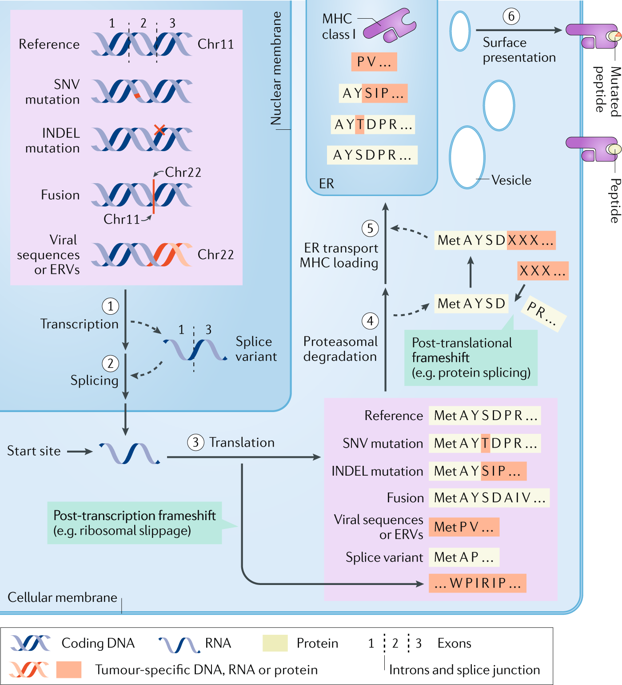当前位置:
X-MOL 学术
›
Nat. Rev. Cancer
›
论文详情
Our official English website, www.x-mol.net, welcomes your
feedback! (Note: you will need to create a separate account there.)
Alternative tumour-specific antigens.
Nature Reviews Cancer ( IF 72.5 ) Pub Date : 2019-07-05 , DOI: 10.1038/s41568-019-0162-4 Christof C Smith 1, 2 , Sara R Selitsky 2, 3 , Shengjie Chai 1, 2, 4 , Paul M Armistead 2, 5 , Benjamin G Vincent 1, 2, 4, 5, 6 , Jonathan S Serody 1, 2, 5, 6
Nature Reviews Cancer ( IF 72.5 ) Pub Date : 2019-07-05 , DOI: 10.1038/s41568-019-0162-4 Christof C Smith 1, 2 , Sara R Selitsky 2, 3 , Shengjie Chai 1, 2, 4 , Paul M Armistead 2, 5 , Benjamin G Vincent 1, 2, 4, 5, 6 , Jonathan S Serody 1, 2, 5, 6
Affiliation

|
The study of tumour-specific antigens (TSAs) as targets for antitumour therapies has accelerated within the past decade. The most commonly studied class of TSAs are those derived from non-synonymous single-nucleotide variants (SNVs), or SNV neoantigens. However, to increase the repertoire of available therapeutic TSA targets, 'alternative TSAs', defined here as high-specificity tumour antigens arising from non-SNV genomic sources, have recently been evaluated. Among these alternative TSAs are antigens derived from mutational frameshifts, splice variants, gene fusions, endogenous retroelements and other processes. Unlike the patient-specific nature of SNV neoantigens, some alternative TSAs may have the advantage of being widely shared by multiple tumours, allowing for universal, off-the-shelf therapies. In this Opinion article, we will outline the biology, available computational tools, preclinical and/or clinical studies and relevant cancers for each alternative TSA class, as well as discuss both current challenges preventing the therapeutic application of alternative TSAs and potential solutions to aid in their clinical translation.
中文翻译:

替代肿瘤特异性抗原。
在过去十年中,以肿瘤特异性抗原(TSA)作为抗肿瘤治疗靶点的研究不断加速。最常研究的 TSA 类别是源自非同义单核苷酸变体 (SNV) 或 SNV 新抗原的 TSA。然而,为了增加可用治疗 TSA 靶点的库,最近对“替代 TSA”(此处定义为来自非 SNV 基因组来源的高特异性肿瘤抗原)进行了评估。这些替代性 TSA 包括源自突变移码、剪接变体、基因融合、内源性逆转录因子和其他过程的抗原。与 SNV 新抗原的患者特异性不同,一些替代 TSA 可能具有被多种肿瘤广泛共享的优势,从而实现通用的现成疗法。在这篇意见文章中,我们将概述每个替代 TSA 类别的生物学、可用的计算工具、临床前和/或临床研究以及相关癌症,并讨论当前阻碍替代 TSA 治疗应用的挑战以及帮助解决这一问题的潜在解决方案。他们的临床翻译。
更新日期:2019-11-18
中文翻译:

替代肿瘤特异性抗原。
在过去十年中,以肿瘤特异性抗原(TSA)作为抗肿瘤治疗靶点的研究不断加速。最常研究的 TSA 类别是源自非同义单核苷酸变体 (SNV) 或 SNV 新抗原的 TSA。然而,为了增加可用治疗 TSA 靶点的库,最近对“替代 TSA”(此处定义为来自非 SNV 基因组来源的高特异性肿瘤抗原)进行了评估。这些替代性 TSA 包括源自突变移码、剪接变体、基因融合、内源性逆转录因子和其他过程的抗原。与 SNV 新抗原的患者特异性不同,一些替代 TSA 可能具有被多种肿瘤广泛共享的优势,从而实现通用的现成疗法。在这篇意见文章中,我们将概述每个替代 TSA 类别的生物学、可用的计算工具、临床前和/或临床研究以及相关癌症,并讨论当前阻碍替代 TSA 治疗应用的挑战以及帮助解决这一问题的潜在解决方案。他们的临床翻译。











































 京公网安备 11010802027423号
京公网安备 11010802027423号